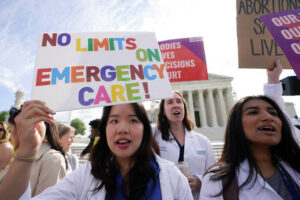Kennedy and Trump paint bleak picture of chronic disease in US children
WASHINGTON — President Donald Trump and Health Secretary Robert F. Kennedy Jr. on Thursday set forth their vision for how to “make America healthy again” with the release of an expansive report on a crisis of chronic disease in children.
The report lays the blame on ultraprocessed foods, chemical exposures, stress, lack of physical activity and excessive use of prescription drugs, including antidepressants.
ADVERTISING
The product of a presidential commission led by Kennedy, the report paints a bleak picture of American children, calling them “the sickest generation in American history.” Rather than set out specific policy prescriptions, it offers up carefully selected studies and proposes new research.
But it is unmistakably Kennedy’s worldview, echoing many of the talking points — some intensely disputed — that the health secretary, a former environmental lawyer and outspoken vaccine skeptic, has repeated for decades.
Kennedy has long blamed a broken food system and environmental toxins for what he sees as an epidemic of childhood chronic disease. The document puts a heavy emphasis on both.
It spotlights ultraprocessed foods and drinks like sodas, chicken nuggets, instant soups and many packaged snacks, which make up nearly 70% of the calories consumed by children and adolescents. It calls attention, as well, to the stew of chemicals in air, food and water to which children are exposed, beginning in the womb.
In some cases, the report misrepresents existing scientific consensus. It implies, for example, that the increase in routine immunizations given to children may be harmful to them, which many scientists say is based on an incorrect understanding of immunology. It calls for further scientific inquiry “into the links between vaccines and chronic disease,” despite dozens of studies that have failed to find a link.
Thursday’s release of the report featured a roundtable discussion in the East Room of the White House between Trump and the Cabinet secretaries and other top administration officials who make up the commission.
The event reflected the topsy-turvy state of American politics, in which Republicans have suddenly sought an image as the party of good health even as Trump and Kennedy lay waste to the nation’s public health and biomedical science apparatus.
Kennedy called the 68-page report “a call to action for common sense,” and “an invitation to the American people and the American press to have a complex conversation about a nuanced subject.”
If there was a unifying theme to the document, it is that the government has invested far too much in research to develop treatments for chronic ailments like heart disease, cancer, obesity and depression — and far too little in understanding the causes of disease and how to prevent it. It also pointed a finger at the food and chemical industries and their corporate influence in federal policymaking.
It singles out pesticide manufacturers, in particular, saying they spend billions of dollars on research intended to sway policymakers — a “ghostwriting strategy,” the report said, that “mirrors tactics used by the tobacco industry to distort scientific consensus.”
Public health experts offered mixed reactions. Peter G. Lurie, the president of nonprofit consumer advocacy group Center for Science in the Public Interest, called the document a “cherry-picked recapitulation of the secretary’s own pet peeves.”
And Dr. Sean O’Leary, chair of the American Academy of Pediatrics’ Committee on Infectious Diseases, said the report “sows doubt in the safety of the childhood vaccine schedule” in the midst of a measles outbreak that continues to spread.
But Tracey Woodruff, director of the Program on Reproductive Health and the Environment at the University of California, San Francisco, and a former scientist for the Environmental Protection Agency, said the report “lists many of the toxic chemicals we have been pushing the government to address.”
She was thrilled to see the recognition of corporate influence on scientific research. “But,” she added, “you can’t do anything to solve the children’s health crisis if you are dismantling the EPA.”
Under the executive order Trump issued establishing what he called the “Make America Healthy Again Commission” — or the MAHA Commission — the panel has 80 more days to outline a strategy to combat childhood chronic disease.
Whatever steps Kennedy takes could put him on a collision course with industry. Moments after the report’s release Thursday, the sugar industry issued a statement noting that sugar consumption is declining, and suggesting it was not to blame for childhood obesity.
© 2025 The New York Times Company





